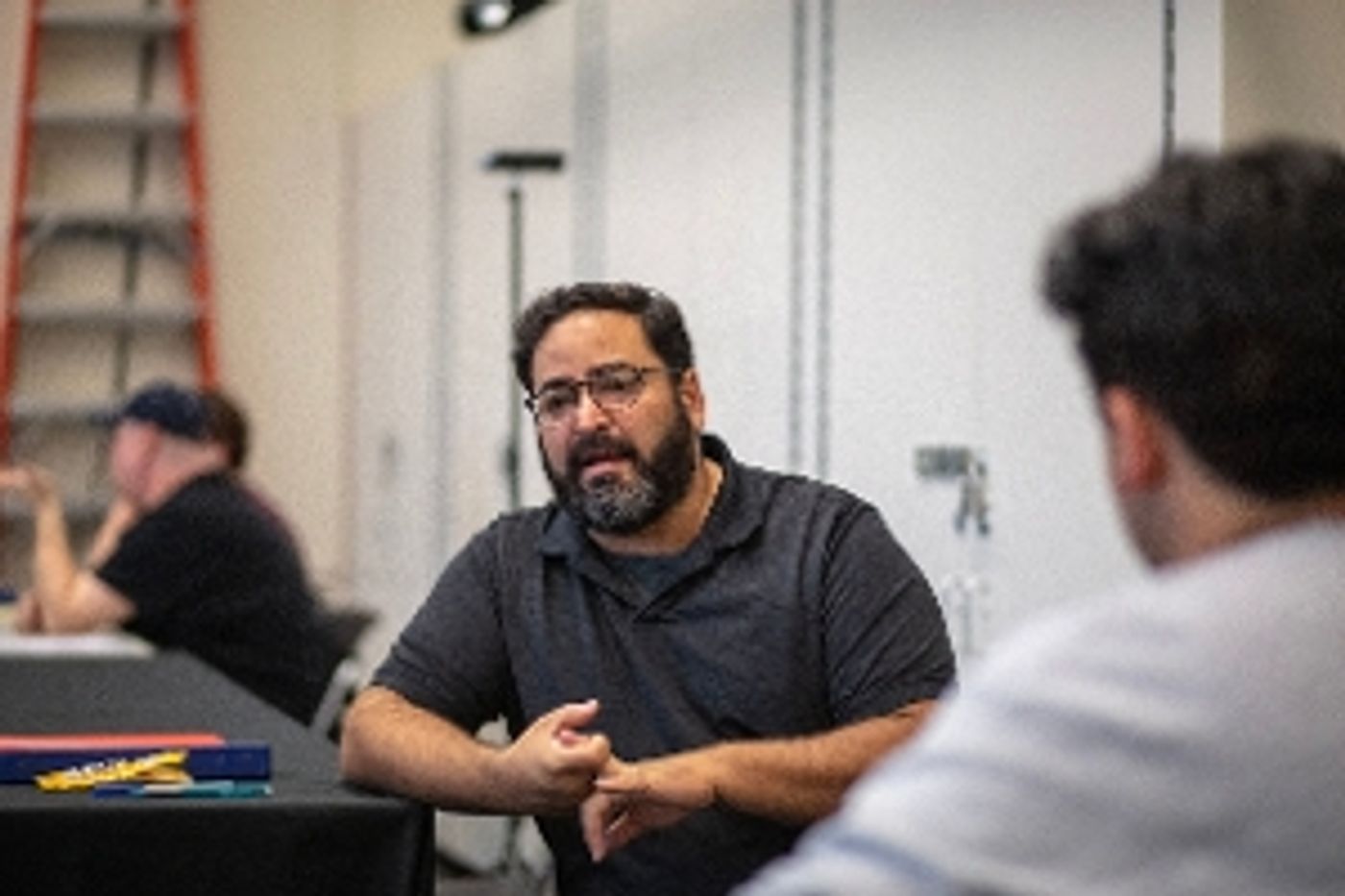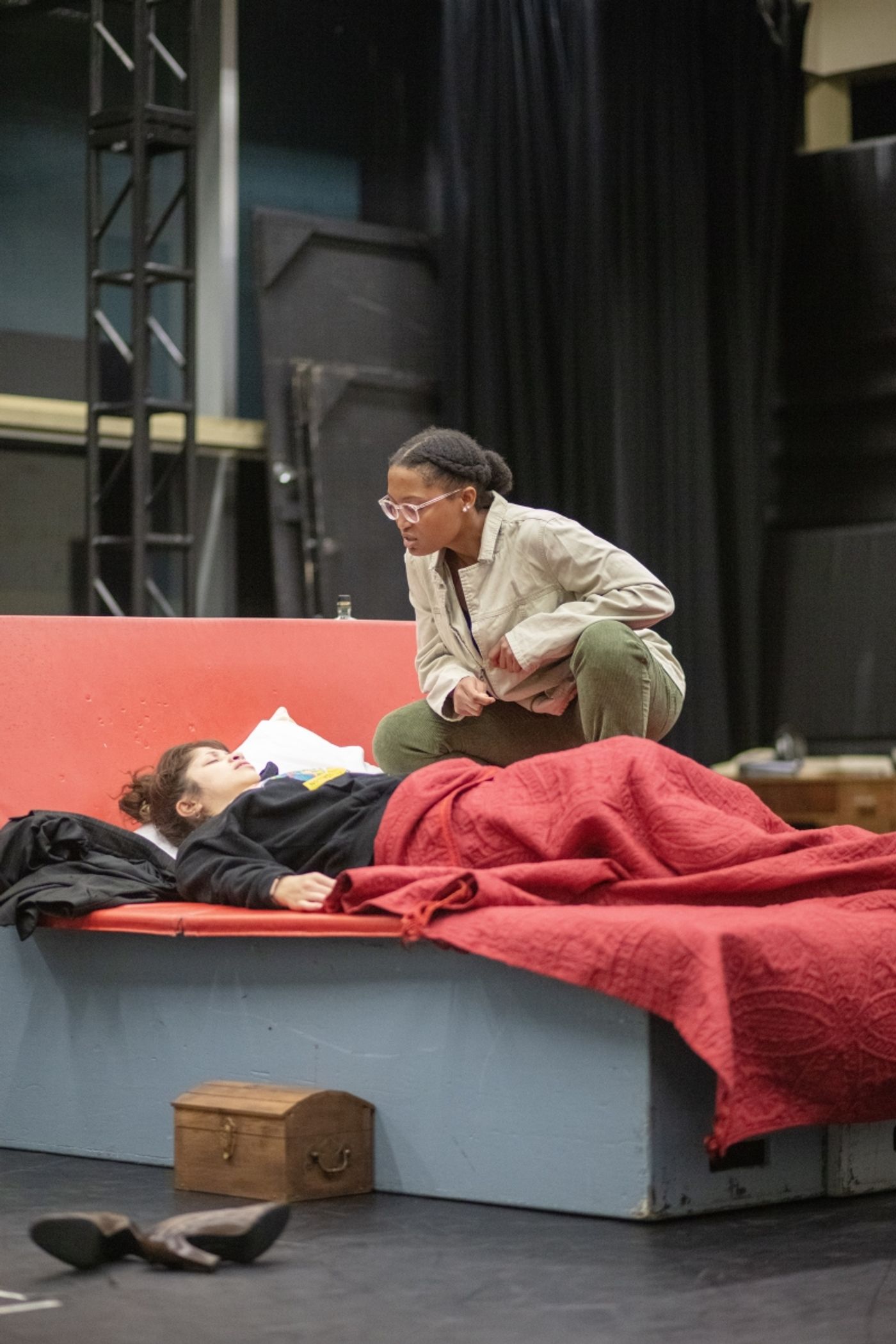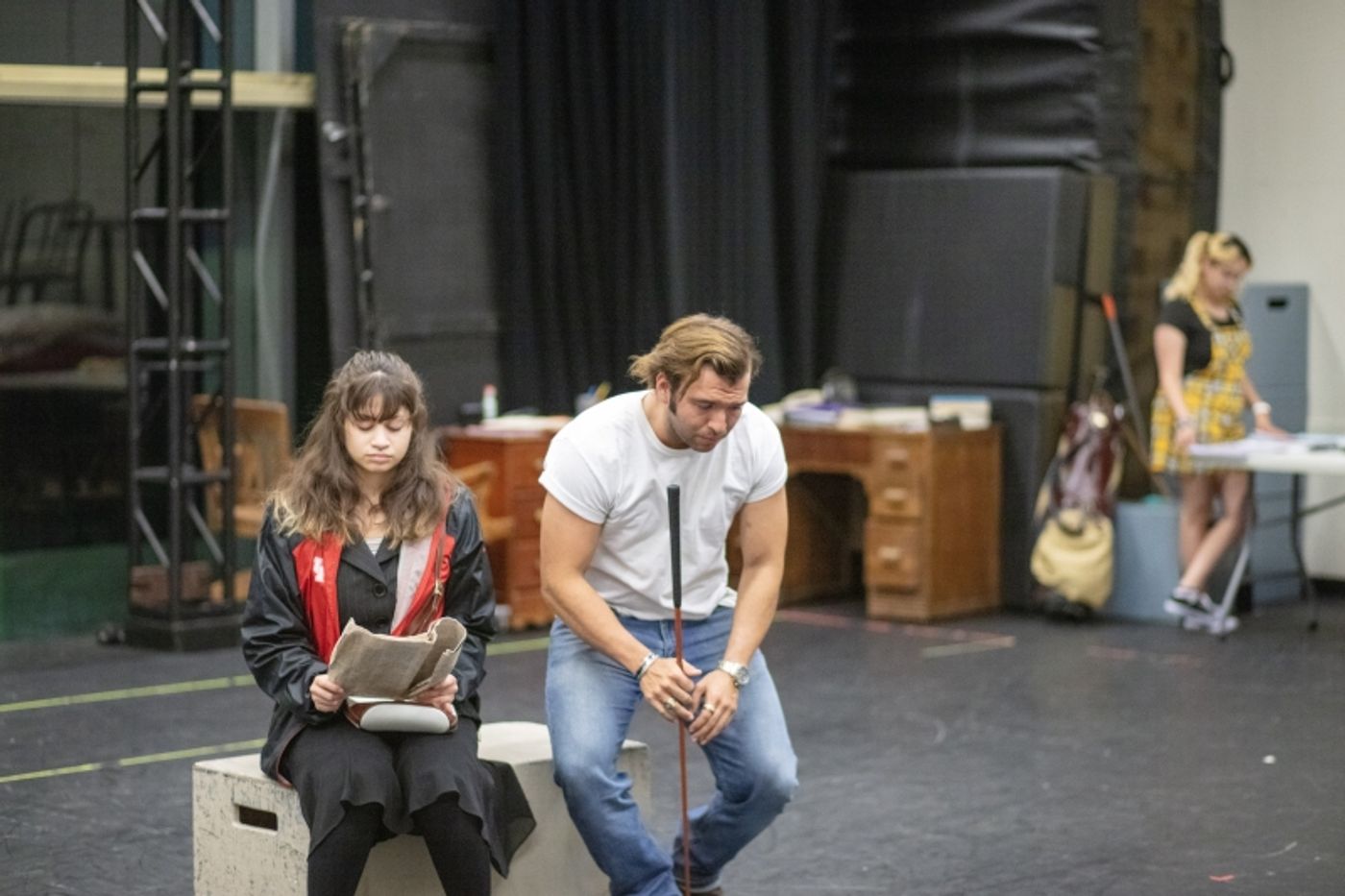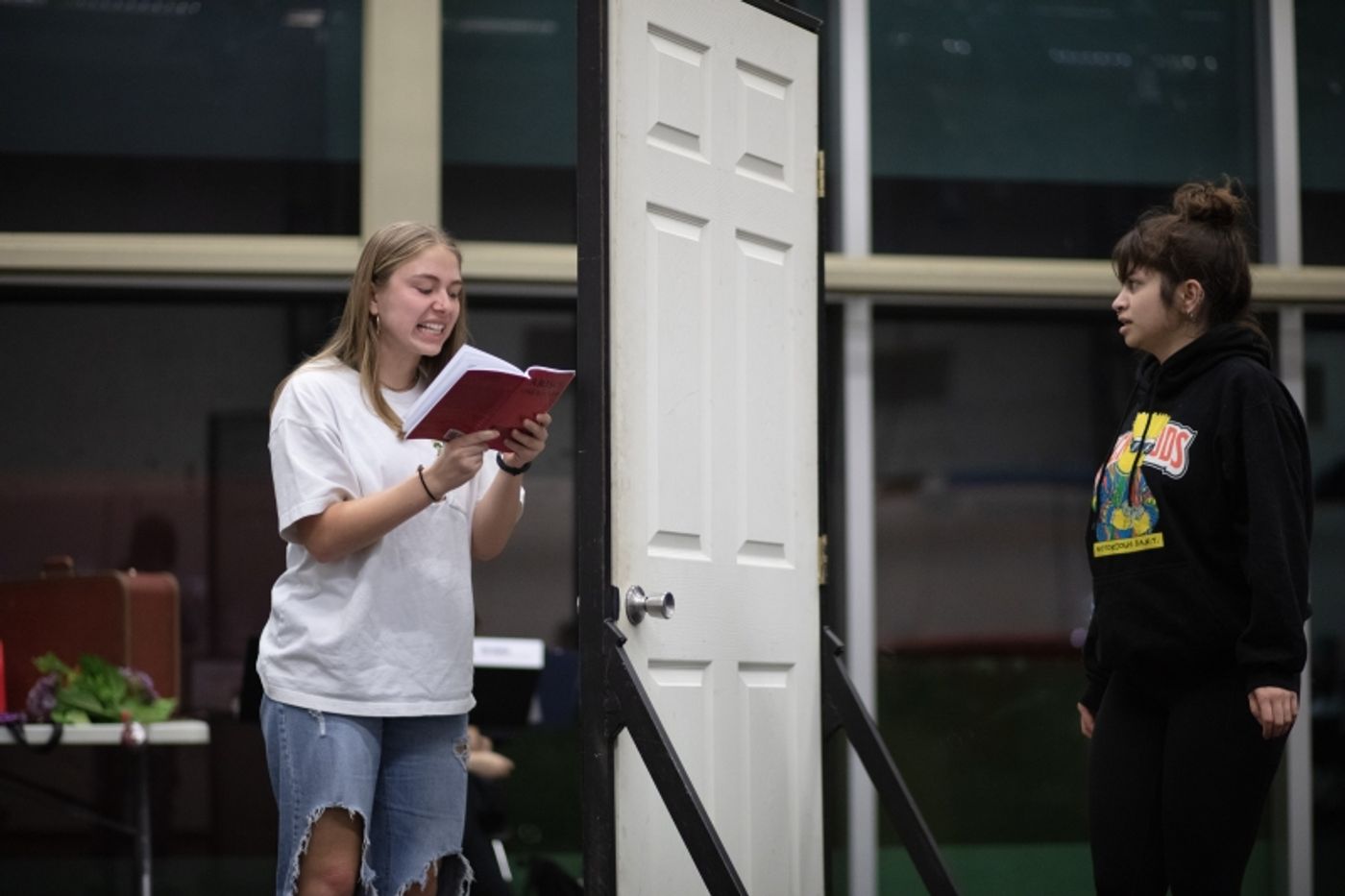Interview: Director Jose Zayas Shares the Magic of MARISOL at the University Of Houston
Do not miss this spectacular production, which is only running for two weekends!

In Action During a Rehearsal
Photo by Felipe Harker
This weekend, the University of Houston will be starting their run of MARISOL, a play written by José Rivera, a playwright who is also the first Puerto Rican screenwriter to be nominated for an Oscar. This magical production follows the story of a young woman named Marisol who has a guardian angel that leaves her to start a war in the heavens. I had the honor to speak with Jose Zayas, the director of the production, and it was a delight to learn more about the show, its process, and the technical spectacle and beauty of this production.
For our readers, can you tell us a little bit about MARISOL? What is a summary of what the show is about, and what is its theme?

the Magic of MARISOL
Photo by Felipe Harker
MARISOL is a play written in the 90s by Jose Rivera, one of the great Puerto Rican writers. This piece is one of his earliest plays, written at a time when we all thought the world was going to end, and it deals with a young woman named Marisol, a Puerto Rican living in the Bronx. She finds herself with a guardian angel, and her guardian angel comes to her dreams, tells her that she's about to start a war in heavens, and leaves Marisol. The guardian angel's departure brings about great turmoil on earth and in Marisol's life, bringing about the journey of the show. In his writing, Rivera deals with issues of homelessness, identity, and other issues that are still relevant today. What does it mean to be Puerto Rican between cultures? What does it mean to be a woman in a very complicated city and time, like New York? What does it feel like when you believe that everything is about to collapse? This theatrical piece is magic realism, but I think that all of its themes are really grounded in the turmoil that people feel in moments of great transition and great doubt.
Do you have any personal connection with the show's content?
I am Puerto Rican myself. I grew up in the Virgin Islands and the Dominican Republic, and I came to the United States in 1992, which is when the play was written. So, my personal connection with the show is how it talks about my culture and the people that I know in a moment when people were not really writing about us. The fact that he wrote about our culture through a magic realist lens and in a way that did not dehumanize us is incredibly impactful. Rivera also tackles the subject of identity and the complexities of living and sitting between cultures so beautifully, which still resonates with me. Anybody who's going through these issues will be able to relate.
Do you have any connection with Jose Rivera, the playwright of MARISOL?
I do not aside from being Facebook friends. We have unfortunately not connected. However, we have known of each other; the world is small. We just have never actually been able to work on something together, and it's taken me this long to actually work on one of his pieces. I have been directing for over 25 years now, and this is the first time I've tackled one of his pieces. I am very excited about this!
From what you have referenced, you are defining this show as "magic realism". Can you define what this means and why you were drawn to this genre of theatre?

the World of MARISOL
Photo by Felipe Harker
"Magic realism" is a term that was coined during the great explosion of American literature in American publishing. Magic realism was basically a way of writing for Latin American writers who were actually dealing with what it was like to live in South America, where everything feels a little surreal, a little off. An example of a magic realist writer is Gabriel Garcia Marquez. One can sometimes only explain some events of madness through elevated moments of magic. Therefore, to me, magic realism is a grounded, almost-naturalistic reality that has moments which we would consider magic. Magic does not solve the issues of the world; it is just part of the fabric of it. A literary example of magic realism is "The House of the Spirits" by Isabel Allende. In the book, a character is born with green hair. She is a great beauty, she affects people in a particular way, and the fact that she is born with green hair is the piece of magic. In MARISOL, the moon is no longer visible on earth, coffee is extinct, and the characters start experiencing events that are apocalyptic. However, at the same time, the show is about people dealing with the everyday occurrences, the times in our lives when life just feels magical.
Do you have any experience directing magic realism, and are there any challenges with directing such a piece?
A lot of Latin American writers use magic realism, so yes! I think I have directed many, many plays that have used magic realism. With plays like MARISOL, there are many technical challenges. In this play, I have to figure out how to stage an apocalypse! There is an angel, there is a moon reappearing, and there is even a man that is pregnant. I have to figure out how to stage the birth of his child. Additionally, there are a lot of tonal challenges. We must balance a play that is deep with great violence, but also a play that holds great beauty, poetry, and comedy. So, we are constantly skirting the edge of what makes sense and discussing how to guide the audience through the terms and the material.
Very fun! With that in mind, what do you find to be the most interesting technical spectacle in the show?
For me, it is the relationship between Marisol and her angel, as well as the war in heaven and how it affects earth, which is portrayed throughout the entire second act. The story takes place in a universe where everything has been disrupted, so everything that you see in the first act explodes; it is like an Alice in Wonderland version of itself. These elements are greatly difficult and challenging, but it is also really fun.
You have a lot of credits from across the country. What has brought you to Houston?
I had done a play workshop with Hilary Bettis as part of a new play festival called QUEEN OF BASEL, and that was very successful. We then were asked to do developmental workshops here in Houston, and we then produced the play 72 MILES TO GO... at the Alley Theatre. Therefore, I had been to the Alley Theatre a number of times, and my experience there led me to the University of Houston. Rob Shimko invited me to direct something for the University of Houston, and it was really a conversation that started during the beginning of the pandemic. It took us a little while to get here as everybody was figuring out what the next steps were. At one point, this was going to be a reading or a production done online because we were not sure about what to do with COVID. However, once things started opening up, the University of Houston decided to do it live. I consider myself lucky that this has happened! Houston has been a good creative home for me over the last couple of years.
What have you enjoyed about working with the University of Houston on building this piece of theatre?

Getting Into Character
Photo by Felipe Harker
I love the commitment of the students, and I love working in a school because the students are so hungry. They are malleable, they want notes, and they want to experiment. As a director, you push them out of their comfort zones, and that creates really interesting work. Nobody really quite knows where it is going to go because of that, and the pressures of trying to create something professional are very different than working in a school because it is really all about the learning process. I even learn a lot as I am doing this work; I usually take a lot more chances with material that I am working on in a university setting. I am basically a teacher to everybody, but I think having the conversations, seeing the designers who are struggling with the difficulties of the material, and watching as they meet the challenges are exciting. Without having the pressures of a professional schedule, I think you get to do an experiment in a different way, and I always find that amazing.
What do you think is the biggest lesson that you want to teach the cast and/or the audience?
That's a hard one because you never know what lesson everyone is going to get! It is all individual.
However, I hope that the actors and everybody involved with the productions that I direct learn how to be aware of storytelling. I make choices based on storytelling beats, so whenever I find myself stuck, I always go back to what the story is. That solves a lot of issues with me; you can fill in so much if you are very aware of what your story is. The actors are already doing beautiful technical work in their classes, and they are learning how to use their toolkit differently with this show. I wish to empower them to read story, to have text analysis skills, and to really look at a text in a way that is individual to them. They then will be empowered to talk about the stories they are telling, which is really what MARISOL is about. How do you find your own power? You find your own power in the stories you tell.
I wish for the audience to walk away with hope. MARISOL is a play that goes through many different terrible things, but ultimately, it is a play of hope.
To finish us off here, why should people come to this show?
Jose Rivera is our most produced playwrights in the country, but many people do not really know him that much. Therefore, I think people should come see it because it is a joy to watch one of his shows. The show is visually exciting and to watch the actors commit fully to the muscularity of Rivera's vision and poetry is great. I am hoping that audiences will be excited by what they see and the possibilities that the show presents!
MARISOL is running from October 22nd through October 30th at the University of Houston. You can buy tickets here. General admission is only $20. Do not miss this truly mystical production, which is here for only two weekends. Buy your tickets now!
Videos

